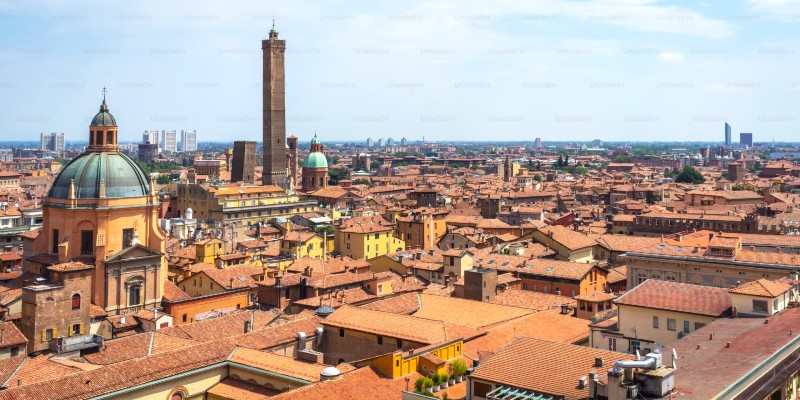Bologna, capital of northern Italy’s Emilia-Romagna region. With only about 400,000 citizens the city is still one of Italy’s most multicultural, largely due to being a university town. Widen out the region and it’s a million people. Alternatively known as the Fat City for its rich cuisine, or the Red City for its red tiled rooftops, and sometimes the Learned City as Bologna is home to the world’s oldest university (in continuous operation). It’s also a beautiful city – a massive UNESCO World Heritage site and also, of course, a city with some fine crime writing. Or should we say Gialli – Italian crime fiction books? The name comes from the covers of a popular Italian series of crime fiction stories launched by Milanese publisher Mondadori in 1929, which were yellow (in Italian: giallo).
Without doubt the two major Bolognese giallisti are Loriano Machiavelli and Carlo Lucarelli. However, sadly we have no books of Machiavelli’s, featuring his long running character policeman Sarti Antonio. Italian readers are more fortunate in having access to Machiavelli’s novels (approximately 40 in total!) that recount the changes in the city. Alongside Andrea Camilleri (of the Inspector Montalbano books) Machiavelli is the most prolific post-war Italian giallisti. Time for someone to head to Emilia-Romagna and buy up those rights! We do fortunately have some Carlo Lucarelli – known as the “master of Italian noir”. Lucarelli is best known for his Inspector De Luca trilogy, and the successful TV show (for which he wrote the scripts too) following Commissario Achille De Luca navigating the world of crime and politics in Mussolini-era fascist Bologna between 1938 to 1948 – “he’s not a fascist/he’s not a partisan/he’s a cop”. The first instalment in the enormously successful De Luca Trilogy (which are all short and essentially novellas) is Carte Blanche (1990), followed by The Damned Season (1991) set in the immediate post-war years and (perhaps the best) Via Della Oche (1996) where a murder in a brothel on a notorious street in the centre of Bologna in the run-up to elections that will decide a nation’s fate. Lucarelli also has several stand-alone novels translated into English including Almost Blue (1997) where a serial killer is loose in Bologna and rookie Detective Inspector Grazia Negro is assigned the case. She only has one witness who can identify the killer – and he is blind. Lucarelli was was shortlisted for the UK Crime Writers’ Association Gold Dagger in 2003 for Almost Blue. Grazia Negro returns in Day After Day (2000) hunting a professional killer whose picture of a pit bull terrier left behind at each murder can link the crimes and stalks the internet too.
I think it’s fair to say that Italian giallisti prefer their heroes to be cops – flawed often, but still policemen and women. A fairly rare example of a professional private eye in Italian crime fiction is Bologna-born Grazia Verasani’s PI Giorgia Cantini, who lives in Bologna, is single, in her forties, independent, hard-drinking, ironic, and haunted by two family suicides. She features in a popular trilogy in Italian that inspired a movie though only the first in the series, Quo Vadis, Baby? (2005), has been translated into English so far. It’s got everything that symbolises Bologna – ancient streets, the old university, and leftist politics. It’s also hard-core noir, nobody is happy, everybody’s miserable – the Cantini Detective Agency mostly investigates the tangled affairs of unhappily married couples and domestic violence. Hopefully more from Verasani will be translated as she is a genuinely original voice from Bologna.
Leftist agitators and property moguls are at the heart of Tom Benjamin’s novel A Quiet Death in Italy (2020), the first in a trilogy. A radical protestor is found floating in one of Bologna’s underground canals. PI Daniel Leicester, son-in-law to the former chief of the Bologna police, receives a call from the dead man’s lover, he follows a trail that begins in the 1970s and leads all the way to the rotten heart of the present-day political establishment. The novel is a great trawl through Bologna’s underbelly. Leicester returns The Hunting Season (2021) set during truffle season in the hills around Bologna the hunt is on for the legendary Boscuri White, much prized by Italian gastronomy. But it’s soon back to the underbelly of the city’s catering trade and illegal immigration. And finally Requiem in La Rossa (2022) where a professor of music is apparently murdered leaving the Bologna opera. Leicester follows a trail that begins among Bologna’s close-knit classical music community and eventually leads to a serial killer at large.
A few more Bologna set novels…
- Gianluca Morozzi’s Blackout (2008) is set in Bologna in August with its unbearable heat and empty streets. Three people become trapped in a lift in a deserted building on a holiday weekend. There’s nobody to help, one of them is a serial killer.
- John Grisham takes a trip to Bologna in The Broker (2010) where the CIA obtain a presidential pardon for a man who has secrets. His is given a new identity and a new life in Bologna. But now someone has come to kill him.
- Our old friend from Venice Aurelio Inspector Zen goes to Bologna in Michael Dibdin’s Back to Bologna (2005). The corpse of the shady industrialist who owns the local soccer team is found both shot and stabbed with a Parmesan knife. Then a world-famous university professor is shot with the same gun after publicly humiliating Italy’s leading celebrity TV chef. And along comes a semiotics student and Tony Speranza, Bologna’s most flamboyant private detective. This is a very Italian crime novel!
A true crime from Bologna – Monica Calabritto’s Murder and Madness on Trial (2023) goes back to 1588 Bologna. Paolo Barbieri stabbed his wife, Isabella Caccianemici, to death with his sword. Later, Paolo would claim to have acted in a fit of madness—but was he criminally insane or merely pretending to be? This is a case study in the diagnosis of insanity in the early modern era, Barbieri’s story reveals discrepancies between medical and legal definitions of a person’s mental state at the time of a crime.
And finally, as usual, something a little bit different and a little bit special – Giampiero Rigosi’s Night Bus (2006). Truly hard-core Italian noir – Leila drugs the men she picks up and then robs them. However, problems arise when her latest client has mistakenly acquired a document that could compromise certain corrupt politicians willing to kill to get it back. She is hunted through Bologna and while on the run meets Francesco, bus driver and gambling addict. A dark, broody novel that takes you on a nightmare trip through Bologna.

















